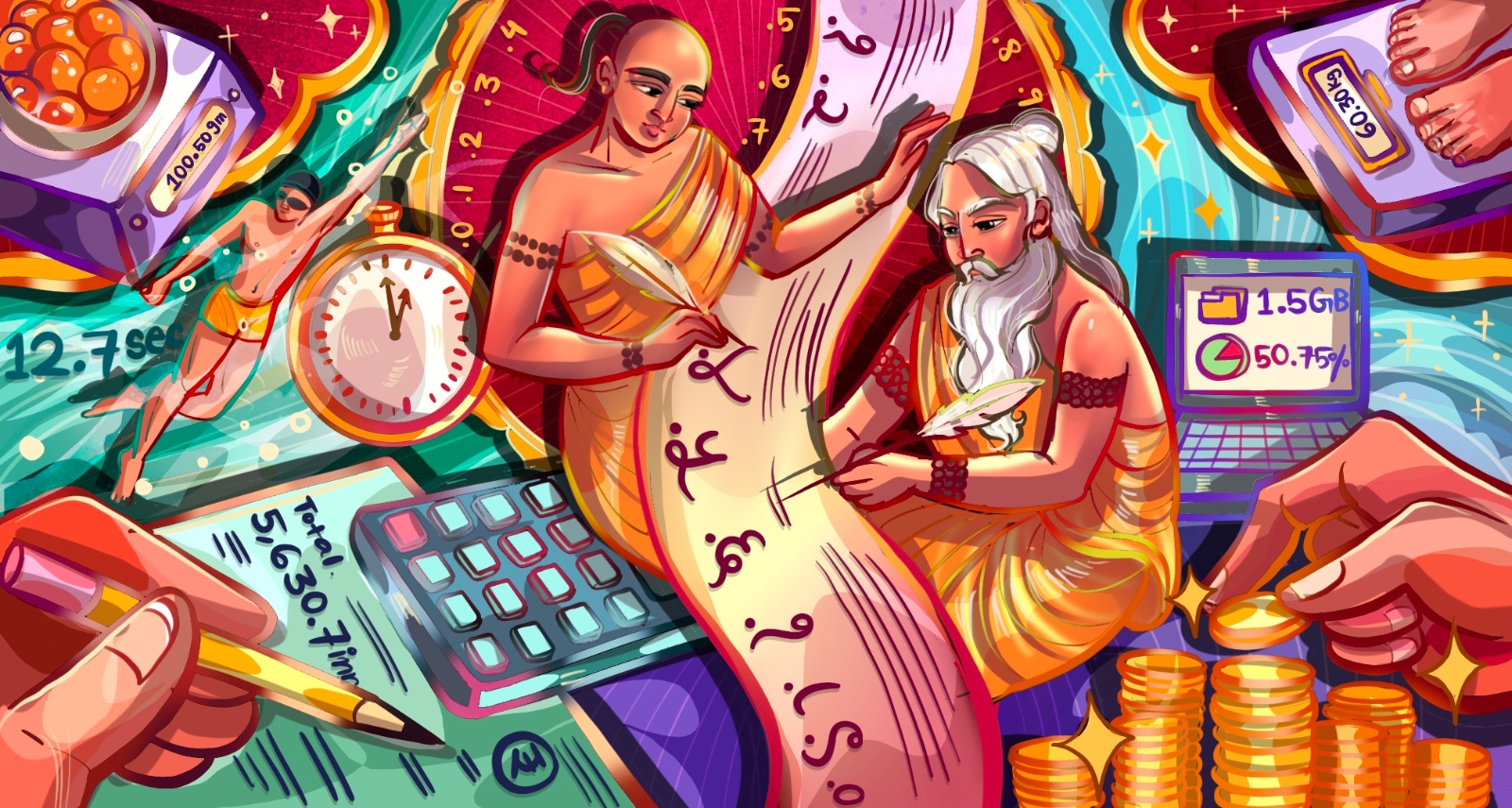The invention of the decimal system, with its cornerstone zero, stands as one of the most pivotal moments in human history. The origins of the decimal system and the concept of zero have been debated, but significant evidence points to ancient India as a key contributor to its development.
Enjoy 0% GST on your policy premium. Get ₹1 Cr. Life Cover at just ₹22.5/day* + 10%^ Online Discount with IndiaFirst Life ELITE Term Plan (UIN 143N070V01). *^T&C Apply.
Know More
Tired of complicated insurance? We’ve made it effortless - Introducing IndiaFirst Life app-like tool Calculate, plan, and protect—all from your device. Your future is just a tap away.
Install now!

IndiaFirst Life Elite Term Plan

IndiaFirst Life Radiance Smart Invest Plan

IndiaFirst Life Elite Term Plan

IndiaFirst Life Radiance Smart Invest Plan

IndiaFirst Life Radiance Smart Invest Plan
Enjoy 0% GST on your policy premium. Get ₹1 Cr. Life Cover at just ₹22.5/day* + 10%^ Online Discount with IndiaFirst Life ELITE Term Plan (UIN 143N070V01). *^T&C Apply.
Know More
Tired of complicated insurance? We’ve made it effortless - Introducing IndiaFirst Life app-like tool Calculate, plan, and protect—all from your device. Your future is just a tap away.
Install now!

-
Term Insurance
-
Term Insurance Plans
-
Income Based Term Plans
-
Term Insurance Coverage Options
Term Insurance Coverage Options

-
Term Insurance for EveryOne
-
Term Insurance For Coverage for all Ages
Term Insurance For Coverage for all Ages

-
Term Insurance Calculator
Term Insurance Calculator

-
Term Insurance Riders
Term Insurance Riders

-
Term Insurance Plans
-
Life Insurance Plans
-
Term Insurance Plan
-
ULIP Plans
-
Savings Plans
-
Retirement & Pension Plans
-
Guaranteed Returns Plans
-
Life Insurance Rider
-
Group & Corporate Life Insurance Plans
Group & Corporate Life Insurance Plans

-
Child Insurance Plans
Child Insurance Plans

-
Term Insurance Plan
-
Tools & Calculators
-
Learn
-
Claim
-
Support
-
$ Plans for NRI’s

No results for
Check that your search query has been entered correctly or try another search.

Let Us know a suitable time for you.
Ask an Expert to Buy Life Insurance
We're happy to know that you're prioritizing your family's future. Our life insurance expert will assist you in finding the best insurance plan. To schedule a call, please share some of the below details.
Male
Female
Other

Thankyou for submitting your details
Our representative will reach out to you soon to guide you through our life insurance plans that fit your life goals
08 Apr 2025
India's Decimal Invention: A Revolutionary Contribution to Mathematics

Introduction
An Inkling of an Idea
The journey of the decimal system began with the ancient Indian sages, who first conceptualised a symbol to represent zero. This seemingly simple addition to numerical notation revolutionised mathematics, empowering scholars to manipulate numbers of any magnitude with ease. The Indian mathematicians of the classical period, including luminaries like Aryabhata, Brahmagupta, Mahavira, and Bhaskara II, not only incorporated zero into their positional numerical system but also elevated it to the status of an independent number with unique properties.
Around the year 500, Aryabhata introduced a decimal system of positional numeration, laying the groundwork for modern mathematics. Although he used the word "kha" instead of a symbol for zero, subsequent scholars like Brahmagupta in the seventh century solidified zero as a bona fide number, essential for arithmetic operations.
Finding Beauty and Elegance in Simplicity
The beauty of the positional decimal system lies in its simplicity. With just ten digits—0 to 9—any number can be expressed, making complex calculations more manageable. This contrasts sharply with non-positional systems like the Roman numerals, which require numerous symbols and hinder efficient computation.
Inscriptions dating back to the seventh century provide evidence of the zero symbol's existence, however, it was the Bakhshali Manuscript, discovered in 1881, that confirmed the presence of the oldest known zero symbol dating back to the third or fourth century. This manuscript, along with earlier writings by Aryabhata and Brahmagupta, underscores India's primacy in the development of the decimal system.
The significance of zero extended beyond mere placeholder value; it facilitated groundbreaking advances in arithmetic and algebra. Indian mathematicians seamlessly incorporated zero into operations, paving the way for solving polynomial equations and manipulating irrational numbers like √2 and √3.
An Idea that Echoes Through the Ages
The decimal system's impact transcended geographical boundaries, enriching mathematical discourse worldwide. Arab, European, and Asian civilisations engaged in extensive commercial exchanges, facilitating the dissemination of Indian mathematical concepts. However, it was the Italian mathematician Fibonacci who popularised the decimal system in the West, coining the term "zero" derived from the Arabic "sifr", meaning empty.
India's mathematical heritage traces back over 2,500 years, evident in the Vedic period's decimal system and geometric principles encoded in ancient texts. Mathematical prowess flourished alongside religious rituals, with cryptic sutras containing arithmetic rules embedded within chants and prayers.
The decimal system's practical applications in land measurement, commerce, and astronomy underscored its indispensability in Indian society. Notably, Indian astronomers leveraged the decimal system to accurately calculate celestial phenomena, aided by the precision afforded by zero.
The legacy of Indian mathematics endured through centuries, culminating in remarkable achievements like the development of infinite series for trigonometric quantities by the Kerala school in the fourteenth century. Madhava's groundbreaking work on pi, which predates European discoveries, exemplifies India's mathematical prowess.
Conclusion
India's invention of the decimal system stands as a testament to human ingenuity and intellectual curiosity. From its humble origins in ancient texts to its global dissemination, the decimal system has revolutionised mathematics and benefited humanity immeasurably. As we marvel at the elegance of modern arithmetic, let us acknowledge the debt owed to India—a cradle of mathematical innovation that continues to inspire and enlighten us.
References
Openmind BBVA
https://www.bbvaopenmind.com/en/science/mathematics/thus-was-born-the-zero-the-number-that-multiplied-the-power-of-mathematics/#:~:text=Around%20the%20year%20500%2C%20Aryabhata,write%20the%20word%20kha%20insteadVedantu
https://www.vedantu.com/question-answer/the-indian-mathematician-who-gave-the-knowledge-class-7-maths-cbse-60aa57bf0d366a75c16ee12cNature.com
https://www.nature.com/articles/459646a
Find Your Favorite Topic
Subscribe to our Life+ newsletter for exclusive updates & smart financial guidance
विशेष अपडेट और स्मार्ट वित्तीय मार्गदर्शन के लिए हमारे लाइफ+ न्यूज़लेटर की सदस्यता लें
વિશિષ્ટ અપડેટ અને કુનેહભર્યા નાણાંકીય માર્ગદર્શન માટે અમારા લાઈફ+ ન્યૂઝલેટરને સબસ્ક્રાઈબ કરો
ప్రత్యేకమైన నవీకరణలు & స్మార్ట్ ఫైనాన్షియల్ గైడెన్స్ కోసం మా లైఫ్ + న్యూస్ లెటర్ సభ్యత్వాన్ని పొందండి.
निवडक अपडेट आणि उत्तम आर्थिक मार्गदर्शन मिळवण्यासाठी आमच्या लाईफ+ बातमीपत्राचे सदस्यत्व घ्या
பிரத்தியேக புதுப்பிப்புகள் மற்றும் ஸ்மார்ட் நிதி வழிகாட்டலுக்கு எங்கள் வாழ்க்கை + செய்திமடலுக்கு குழுசேரவும்

Thank you for subscribing to Life+ Newsletter!
Keep an eye on your inbox-great things are coming your way









